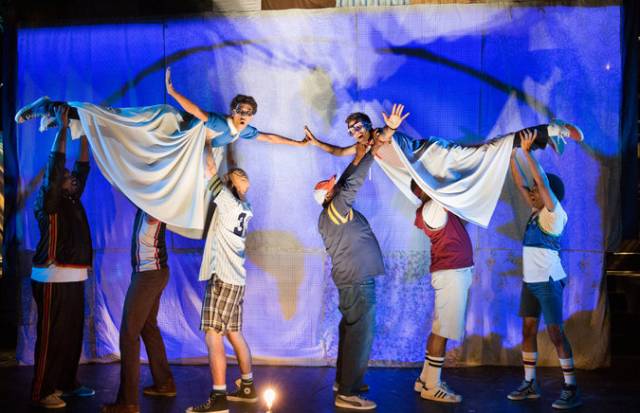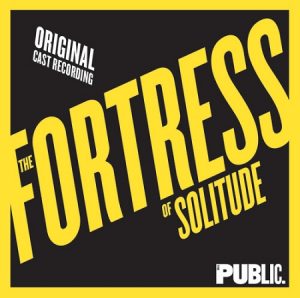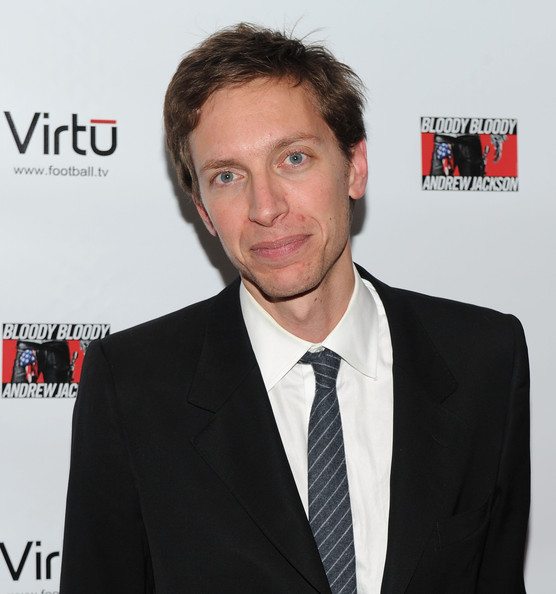
 Beyond his fascination with dead presidents, as seen in the likes of Bloody Bloody Andrew Jackson and the workshop of Here's Hoover! The Historic Herbert Hoover 2014 Comeback Special, composer Michael Friedman is interested in telling stories about young people trying to find their place in the world. In his adaptation of Jonathan Lethem’s The Fortress of Solitude (with a book by Itamar Moses) he uses his inventive music and lyrics to tell the story of two teenagers coming of age in 1970s Brooklyn amidst racial tension. The Off-Broadway production played at The Public Theatre in the fall of 2014, and the cast recording was released in the spring of 2015. To celebrate the occasion, we talked to Friedman who shared some insights about his creative process, talked about how music can be political, and revealed where he thinks the future of musical theatre lies.
Beyond his fascination with dead presidents, as seen in the likes of Bloody Bloody Andrew Jackson and the workshop of Here's Hoover! The Historic Herbert Hoover 2014 Comeback Special, composer Michael Friedman is interested in telling stories about young people trying to find their place in the world. In his adaptation of Jonathan Lethem’s The Fortress of Solitude (with a book by Itamar Moses) he uses his inventive music and lyrics to tell the story of two teenagers coming of age in 1970s Brooklyn amidst racial tension. The Off-Broadway production played at The Public Theatre in the fall of 2014, and the cast recording was released in the spring of 2015. To celebrate the occasion, we talked to Friedman who shared some insights about his creative process, talked about how music can be political, and revealed where he thinks the future of musical theatre lies.
 The Fortress of Solitude was your pet project for a while. Why did you become interested in turning the novel into a musical?
The Fortress of Solitude was your pet project for a while. Why did you become interested in turning the novel into a musical?
I actually read the novel twice, the first time I read it I loved the novel itself, it touched me very deeply and personally because I had a lot of personal connections to it, and I was also very moved by the story of Mingus and Dylan. I read it again, thinking of it more professionally in terms of adaptation, and I think what’s really extraordinary about what Jonathan did in that novel is how much of the history of music from 1967 to the end of the century, he kind of wove into the fabric of the way he told the story. That seemed like a very exciting way to make a musical, how much the music helped tell the story. One of my favorite musicals is Show Boat which does a very similar thing, it’s a big story over time, and part of how it does this is it shows little changes in music to represent changes in times.
Fortress isn’t a jukebox musical but in a way it kinda is a jukebox musical.
It’s like I joke, it’s a jukebox musical with a jukebox that never existed. One of the interesting things in the book - which you could call a historical novel - is that he creates a shadow history of the industry and we were trying to do the same thing. It’s a real place and a real idea but the music itself is a fiction.
In Fortress this is chronological, but for example you’ve already used emo music in Bloody Bloody Andrew Jackson and Britney Spears in Mr. Burns, a Post-Electric Play so would you say you’re trying to tell a history of America through music?
It’s funny, I’m working right now on a show which is an actual history of pop music in America from the mid-nineteenth century until WWI, so I would say I’m interested in the politics of pop music, and that part of it is a historical interest. It actually was interesting working on Mr. Burns simultaneously with Fortress of Solitude, ‘cause they did feel like two sides of some coin that’s hard to describe. I’m so glad you noticed it, I think you’re the first person who’s noticed that, so it’s very gratifying.
And here I thought I was overanalyzing…
No, in this case it’s true! I’m very interested in the legacy of pop music and what it means in American culture.
You have the tendency to use genres anachronistically though.
Yeah, our curtain call in Bloody Bloody was “The Hunters of Kentucky” which was a punk cover of Andrew Jackson’s actual election song. It was sort of the first President’s theme song, so we were connecting that back to the very origins of some popular music.
Speaking of that, were you intimidated by the idea of having to musicalize Shakespeare when you did Love’s Labour’s Lost?
You know, it’s funny, iambic pentameter is famously annoying to set music to, and Shakespeare never wrote his songs in iambic pentameter, it weirdly doesn’t scan very nicely for a normal song. But I actually had fun, and looking at other people who musicalized Shakespeare, once you actually come up with a solution it can be very gratifying. Alex [Timbers] and I love that play, so we approached the whole thing with a lot of love, it’s also one of Shakespeare’s most freewheeling plays where you kinda see him coming into his own as a poet and dramatist, so halfway through you see him learning how to write a romantic comedy. So we took it as a challenge and that was fun.
Going back to Fortress for a second, you were the dramaturg for A Raisin in the Sun in 2004 and I feel like there’s a parallel between Travis Younger and Dylan Ebdus, in how they’re both growing up in a neighborhood that’s changing as racial tensions arise around them. Were you drawing from Lorraine Hansberry when you were writing your version of Dylan?
I think you’re probably right...I hadn’t thought about it that way before, but I think you’re right.

I’m asking because you seem fascinated by the concept of “youth in revolt”, since all of your works are about that. Is this because you were a rebellious youth yourself?
No, in fact I was a rather not rebellious youth (laughs) so it’s funny that I’m drawn to stories like that. It might even be why I’m drawn to stories like that, since I had a fairly happy, well adjusted youth. I’m very interested in the intersection between politics and culture, so I do think that so much youth in revolt is the realization that maybe what you were taught might be wrong, and that’s maybe at the center of most great American art, even things like Moby Dick or Huckleberry Finn, they’re about the fact that the knowledge that you took for granted is actually wrong, the whole deconstructing of myth.
You’re also trying to remind young people that they are democracy.
I think we are a country that has always been very young, both literally as a country and also very much been defined youth. I think we also have distrust in young people, as I grow older I hope I trust youth more than I distrust it. One of my favorite things about working in this show about the history of pop music is that one the earliest music publishing companies was formed by three boys who were all under 18 and they had to get their father’s signature, so he ended up owning the firm. So I love that pop music even in its earliest stage was defined by the taste of 18-year-olds, which is pretty great.
There are many people who still think musical theatre is cheesy and only for dorks, but with the work you do, especially with The Civilians, you’re showing people that musicals can also be about current matters and be thought provoking.
Oh I think of myself as a total dork, and I think why I like musical theatre is because it’s the wonkiest, at least certainly the most unclean, musical form. Even in opera, people always sing, but in musicals people talk, then they break into song, then they talk again...so even though there are aspects of musical theatre that remind you about being an embarrassing eighth grader, I think that’s an important part of what they are. They are unclean which is what makes them powerful, potent and a little explosive, so that’s what I embrace. I love working with The Civilians, it’s one of the best parts of my life, and what is crucial about them is that while we deal with many important issues, there is also a certain wonkiness, an admission of our own incompetence which goes along with that, and I find that combination to be very good. It’s so easy to say we have the right answer, it’s more interesting to admit we might have the wrong answer and that we very likely have no idea what we’re talking about.
The self awareness of musicals always remind me of the effect of the camera, which heightens reality and brings out emotions. You’ve done musicals based on movies and about the movie industry, but so far we haven’t seen any of your musicals on screen. Which one would you like to see become a movie?
I think of all of them Bloody Bloody Andrew Jackson is the one that would be so much fun to do. I’m actually more interested in television than in film for that reason, I think the question of how to have a television show that uses original music in an efficient way, still hasn’t been solved. Glee didn’t use original music, Smash tried one kind of solution, so I think it’s interesting what shows like Nashville and Empire are doing because music is at the center of their story. People who grew up with The Electric Company or The Muppet Show and Sesame Street showed more ways in which music could be used in television, which are things I’m excited in exploring. For me right now, TV is the terra incognita of musical theatre.
You met Alex Timbers on a creative blind date and that worked out quite well. Who would you like to be set up with next?
Gosh, I’m gonna admit something and it’s that right now I’m getting started on a couple of projects where I’m talking to new people. I’m older than I once was, so it’s almost the same as dating where you’re like “oh god, really”. So while I’m open to blind dates with new collaborators, I’m way more ornery than I used to be, so I don’t know if I have a good answer for this. I certainly can’t say I have a dream collaborator, mostly because I’ve been so lucky in the collaborators I’ve had so far, that it’s been one of the great joys of my life.
The Fortress of Solitude Original Cast Recording is now available in stores and online.
To buy tickets to the release party at Joe's Pub on 04/13 visit The Public's website.